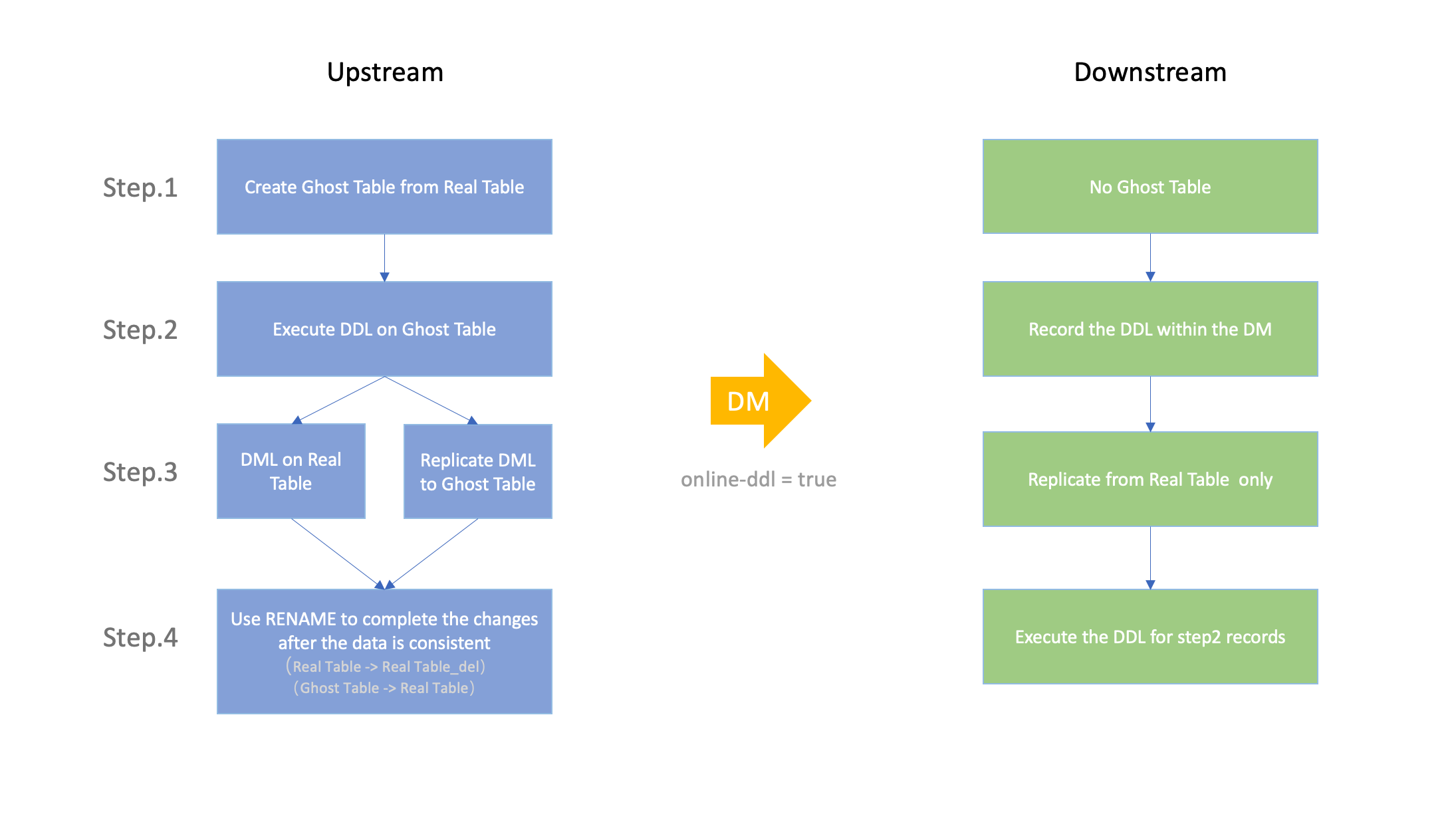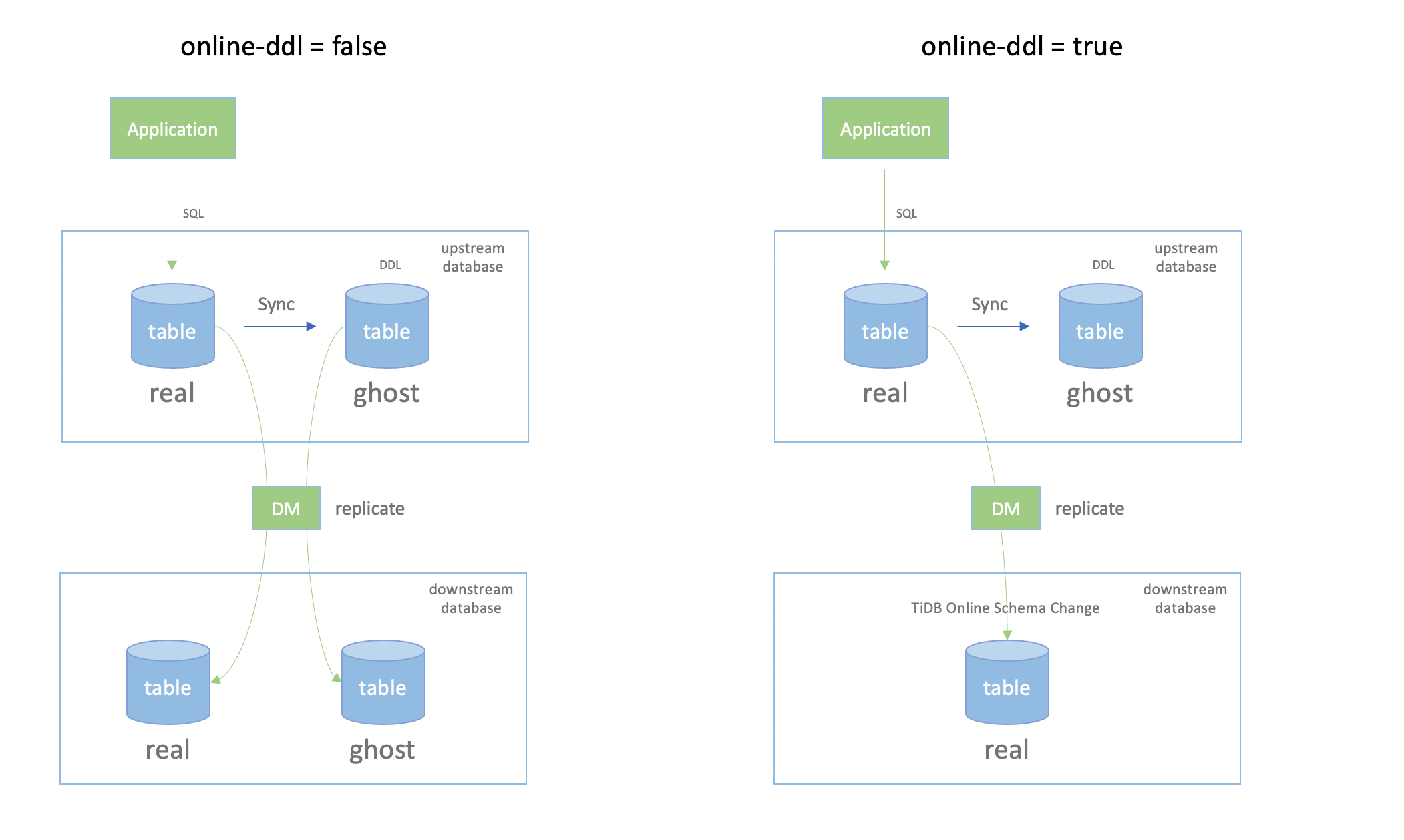Migrate from Databases that Use GH-ost/PT-osc
This document introduces the online-ddl feature of DM when DM is used to migrate data from MySQL to TiDB and how online DDL tools perform during the data migration process.
Overview
DDL statements are always used in database applications. MySQL 5.6 and later versions support the online-ddl feature, but there are limitations. For example, DDL execution sometimes acquires an MDL lock, resulting in a table lock that can block reads or writes to and from a database to a certain extent in production scenarios. In other cases, some DDLs copy the whole table and this affects overall database performance.
Therefore, online DDL tools are often used to execute DDLs to reduce the impact on reads and writes. Common DDL tools are gh-ost and pt-osc.
Generally, these tools work by the following steps:
- Create a new ghost table according to the table schema of the DDL real table;
- Apply DDLs on the ghost table;
- Replicate the data of the DDL real table to the ghost table;
- After the data are consistent between the two tables, use the
renamestatement to replace the real table with the ghost table.

When you migrate data from MySQL to TiDB using DM, online DDL tools can identify the DDLs in the above step 2 and apply them downstream in step 4, which can reduce the replication workload for the ghost table.
online-ddl Configuration
Generally, it is recommended to enbale the online-ddl configuration and you can see the following effects:

- The downstream TiDB does not need to create and replicate the ghost table, saving the storage space and network transmission overhead;
- When you merge and migrate data from sharded tables, the RENAME operation is ignored for each sharded ghost tables to ensure the correctness of the replication;
- Currently, one limitation for DM is that DMLs in this task are blocked until DDL operation is finished when you apply DDL operation to the downstream TiDB. This limitation will be removed later.
Configuration
In the task configuration file, online-ddl is at the same level of name. For example:
# ----------- Global configuration -----------
## ********* Basic configuration *********
name: test # The name of the task. Should be globally unique.
task-mode: all # The task mode. Can be set to `full`/`incremental`/`all`.
shard-mode: "pessimistic" # The shard merge mode. Optional modes are ""/"pessimistic"/"optimistic". The "" mode is used by default which means sharding DDL merge is disabled. If the task is a shard merge task, set it to the "pessimistic" mode. After understanding the principles and restrictions of the "optimistic" mode, you can set it to the "optimistic" mode.
meta-schema: "dm_meta" # The downstream database that stores the `meta` information.
online-ddl: true # Supports automatic processing of "gh-ost" and "pt" for the upstream database.
online-ddl-scheme: "gh-ost" # `online-ddl-scheme` will be deprecated in the future, so it is recommended to use `online-ddl`.
target-database: # Configuration of the downstream database instance.
host: "192.168.0.1"
port: 4000
user: "root"
password: "" # It is recommended to use password encrypted with dmctl if the password is not empty.
For the advanced configuration and the description of each configuration parameter, refer to DM advanced task configuration file template.
When you merge and migrate data from sharded tables, you need to coordinate the DDL of each sharded table, and the DML before and after the DDL. DM supports two different modes: pessimistic mode and optimistic mode. For the differences and scenarios between the two modes, refer to Merge and Migrate Data from Sharded Tables.
Working details for DM with online DDL tools
This section describes the working details for DM with the online DDL tools gh-ost and pt-osc when implementing online-schema-change.
online-schema-change: gh-ost
When gh-ost implements online-schema-change, 3 types of tables are created:
- gho: used to apply DDLs. When the data is fully replicated and the gho table is consistent with the origin table, the origin table is replaced by renaming.
- ghc: used to store information that is related to online-schema-change.
- del: created by renaming the origin table.
In the process of migration, DM divides the above tables into 3 categories:
- ghostTable:
\_\*\_gho - trashTable:
\_\*\_ghc,\_\*\_del - realTable: the origin table that executes online-ddl.
The SQL statements mostly used by gh-ost and the corresponding operation of DM are as follows:
Create the
_ghctable:Create /* gh-ost */ table `test`.`_test4_ghc` ( id bigint auto_increment, last_update timestamp not null DEFAULT CURRENT_TIMESTAMP ON UPDATE CURRENT_TIMESTAMP, hint varchar(64) charset ascii not null, value varchar(4096) charset ascii not null, primary key(id), unique key hint_uidx(hint) ) auto_increment=256 ;DM does not create the
_test4_ghctable.Create the
_ghotable:Create /* gh-ost */ table `test`.`_test4_gho` like `test`.`test4` ;DM does not create the
_test4_ghotable. DM deletes thedm_meta.{task_name}\_onlineddlrecord in the downstream according toghost_schema,ghost_table, and theserver_idofdm_worker, and clears the related information in memory.DELETE FROM dm_meta.{task_name}_onlineddl WHERE id = {server_id} and ghost_schema = {ghost_schema} and ghost_table = {ghost_table};Apply the DDL that needs to be executed in the
_ghotable:Alter /* gh-ost */ table `test`.`_test4_gho` add column cl1 varchar(20) not null ;DM does not perform the DDL operation of
_test4_gho. It records this DDL indm_meta.{task_name}\_onlineddland memory.REPLACE INTO dm_meta.{task_name}_onlineddl (id, ghost_schema , ghost_table , ddls) VALUES (......);Write data to the
_ghctable, and replicate the origin table data to the_ghotable:Insert /* gh-ost */ into `test`.`_test4_ghc` values (......); Insert /* gh-ost `test`.`test4` */ ignore into `test`.`_test4_gho` (`id`, `date`, `account_id`, `conversion_price`, `ocpc_matched_conversions`, `ad_cost`, `cl2`) (select `id`, `date`, `account_id`, `conversion_price`, `ocpc_matched_conversions`, `ad_cost`, `cl2` from `test`.`test4` force index (`PRIMARY`) where (((`id` > _binary'1') or ((`id` = _binary'1'))) and ((`id` < _binary'2') or ((`id` = _binary'2')))) lock in share mode ) ;DM does not execute DML statements that are not for realtable.
After the migration is completed, both the origin table and
_ghotable are renamed, and the online DDL operation is completed:Rename /* gh-ost */ table `test`.`test4` to `test`.`_test4_del`, `test`.`_test4_gho` to `test`.`test4`;DM performs the following two operations:
DM splits the above
renameoperation into two SQL statements.rename test.test4 to test._test4_del; rename test._test4_gho to test.test4;DM does not execute
rename to _test4_del. When executingrename ghost_table to origin table, DM takes the following steps:Read the DDL recorded in memory in Step 3
Replace
ghost_tableandghost_schemawithorigin_tableand its corresponding schemaExecute the DDL that has been replaced
alter table test._test4_gho add column cl1 varchar(20) not null; -- Replaced with: alter table test.test4 add column cl1 varchar(20) not null;
online-schema-change: pt
When pt-osc implements online-schema-change, 2 types of tables are created:
new: used to apply DDL. When the data is fully replicated and thenewtable is consistent with the origin table, the origin table is replaced by renaming.old: created by renaming the origin table.- 3 kinds of Trigger:
pt_osc\_\*\_ins,pt_osc\_\*\_upd,pt_osc\_\*\_del. In the process of pt_osc, the new data generated by the origin table is replicated tonewby the Trigger.
In the process of migration, DM divides the above tables into 3 categories:
- ghostTable:
\_\*\_new - trashTable:
\_\*\_old - realTable: the origin table that executes online-ddl.
The SQL statements mostly used by pt-osc and the corresponding operation of DM are as follows:
Create the
_newtable:CREATE TABLE `test`.`_test4_new` ( id int(11) NOT NULL AUTO_INCREMENT, date date DEFAULT NULL, account_id bigint(20) DEFAULT NULL, conversion_price decimal(20,3) DEFAULT NULL, ocpc_matched_conversions bigint(20) DEFAULT NULL, ad_cost decimal(20,3) DEFAULT NULL,cl2 varchar(20) COLLATE utf8mb4_bin NOT NULL,cl1 varchar(20) COLLATE utf8mb4_bin NOT NULL,PRIMARY KEY (id) ) ENGINE=InnoDB AUTO_INCREMENT=3 DEFAULT CHARSET=utf8mb4 COLLATE=utf8mb4_bin ;DM does not create the
_test4_newtable. DM deletes thedm_meta.{task_name}\_onlineddlrecord in the downstream according toghost_schema,ghost_table, and theserver_idofdm_worker, and clears the related information in memory.DELETE FROM dm_meta.{task_name}_onlineddl WHERE id = {server_id} and ghost_schema = {ghost_schema} and ghost_table = {ghost_table};Execute DDL in the
_newtable:ALTER TABLE `test`.`_test4_new` add column c3 int;DM does not perform the DDL operation of
_test4_new. Instead, it records this DDL indm_meta.{task_name}\_onlineddland memory.REPLACE INTO dm_meta.{task_name}_onlineddl (id, ghost_schema , ghost_table , ddls) VALUES (......);Create 3 Triggers used for data migration:
CREATE TRIGGER `pt_osc_test_test4_del` AFTER DELETE ON `test`.`test4` ...... ; CREATE TRIGGER `pt_osc_test_test4_upd` AFTER UPDATE ON `test`.`test4` ...... ; CREATE TRIGGER `pt_osc_test_test4_ins` AFTER INSERT ON `test`.`test4` ...... ;DM does not execute Trigger operations that are not supported in TiDB.
Replicate the origin table data to the
_newtable:INSERT LOW_PRIORITY IGNORE INTO `test`.`_test4_new` (`id`, `date`, `account_id`, `conversion_price`, `ocpc_matched_conversions`, `ad_cost`, `cl2`, `cl1`) SELECT `id`, `date`, `account_id`, `conversion_price`, `ocpc_matched_conversions`, `ad_cost`, `cl2`, `cl1` FROM `test`.`test4` LOCK IN SHARE MODE /*pt-online-schema-change 3227 copy table*/DM does not execute the DML statements that are not for realtable.
After the data migration is completed, the origin table and
_newtable are renamed, and the online DDL operation is completed:RENAME TABLE `test`.`test4` TO `test`.`_test4_old`, `test`.`_test4_new` TO `test`.`test4`DM performs the following two operations:
DM splits the above
renameoperation into two SQL statements:rename test.test4 to test._test4_old; rename test._test4_new to test.test4;DM does not execute
rename to _test4_old. When executingrename ghost_table to origin table, DM takes the following steps:Read the DDL recorded in memory in Step 2
Replace
ghost_tableandghost_schemawithorigin_tableand its corresponding schemaExecute the DDL that has been replaced
ALTER TABLE `test`.`_test4_new` add column c3 int; -- Replaced with: ALTER TABLE `test`.`test4` add column c3 int;
Delete the
_oldtable and 3 Triggers of the online DDL operation:DROP TABLE IF EXISTS `test`.`_test4_old`; DROP TRIGGER IF EXISTS `pt_osc_test_test4_del` AFTER DELETE ON `test`.`test4` ...... ; DROP TRIGGER IF EXISTS `pt_osc_test_test4_upd` AFTER UPDATE ON `test`.`test4` ...... ; DROP TRIGGER IF EXISTS `pt_osc_test_test4_ins` AFTER INSERT ON `test`.`test4` ...... ;DM does not delete
_test4_oldand Triggers.